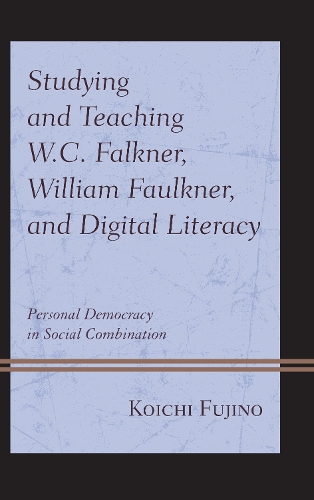
Studying and Teaching W.C. Falkner, William Faulkner, and Digital Literacy: Personal Democracy in Social Combination
(Paperback)
Available Formats
Publishing Details
Studying and Teaching W.C. Falkner, William Faulkner, and Digital Literacy: Personal Democracy in Social Combination
By (Author) Koichi Fujino
Bloomsbury Publishing PLC
Lexington Books
11th February 2020
United States
Classifications
Professional and Scholarly
Non Fiction
Literature: history and criticism
813.52
Physical Properties
Paperback
260
Width 155mm, Height 222mm, Spine 19mm
395g
Description
This book explores the ways to teach the literary works of William Clark Falkner and William Faulkner to ESL (English as a Second Language) students in todays digital environment. William Faulkners great-grandfather, William Clark Falkner, wrote romantic literary works, and William Faulkner critically uses the motifs of his great-grandfathers works to establish his literary world. Applying Mikhail Bakhtins dialogical theory, this book theoretically explains how these two authors imagine the social formations of the American South differently in their literary works. The coined term, social combinationwhich is defined as the individuals mutual effort to have equal relationships for a certain timeis used as a key term to examine how these two authors depict the characters personal relationships. William Faulkner employs his characters social combination as a resistance against the American Souths romantic illusions that are represented by William Clark Falkners literary works. William Faulkners historical perspective is beneficial for todays ESL students, who explore their new egalitarian formations in their digitally expanded world. The last part of this study outlines how an American literary teacher can connect the works of William Clark Falkner and William Faulkner when teaching ESL students by using todays digital environment. Using three digital platformsMoodle, WordPress, and Google Drivea teacher composes egalitarian relationships among class members and inspires students autonomous discussion on these two authors works. Through these activities, ESL students are expected to comprehend that the literature of the American South is not only the historical development of the foreign region, but the phenomenon that is connected to their own social formations.
Reviews
This book offers a unique blend of literary criticism and pedagogy unified under the authors coined term of social combination and the ways the author sees social combination addressed and enacted in the writing of Colonel William Clark Falkner, William Faulkner, and in digitally-supported ESL classrooms. In an impassioned argument that tinges criticism with personal essay, [the author] does an impressive job of weaving various large strands into an interesting and original discussion that can be useful for readers interested in American literature, southern literature, Faulkner, digital humanities, and pedagogy generally. -- Taylor Hagood, Author of Faulkners Imperialism: Space, Place, and the Materiality of Myth
Author Bio
Koichi Fujino is professor of American literature and culture at Seinan Gakuin University.
